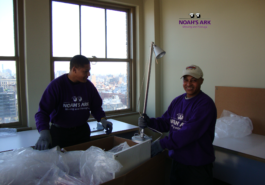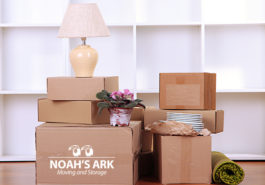 A Positively Moving Experience
A Positively Moving Experience

Packing and Labeling Boxes Like a Pro
Packing boxes for a move is a significant undertaking. Each item you move needs to be considered. For instance, fragile cups, bowls, glasses and stemware need their own packing paper and proper handling. They also need to be placed in the correct room— it’s very important to pack your nest efficiently as well— so when you relocate fewer boxes are moved, which will save you time and money. Labeling and organizing your box is especially important for moving day. Here’s how to organize your boxand label them to perfection. Noah’s Ark Moving company will outline on how packing and labeling boxes Like a Pro for your next move.
1. Grouping
Grouping your items is the first order of business. Items of a similar size should be pared together to create the most space. Items that can be combined or stacked like Russian dolls, pots, pans, bowls, clothing and knick-knacks, should be kept together. But do this: keep items by room in the designated boxes. That way you can unload one room after the next and prioritize this process.
2. Protection
You may want to protect fragile, delicate or one-of-a-kind items with bubble wrap or foam peanuts. Don’t forget to pad the bottom of your boxes to keep your items safe.
3. Heavy First Lighter Later
Put heavier items on the bottom of boxes. This way items don’t get crushed, damaged and permanently destroyed.
4. Weight
Now that you’ve packed your box, slide it over to the scale. Make sure that the box is equipped to keep its structural integrity and that it weighs a descent weight— one manageable for you or others to lift. (Rule of thumb is no more than 40lbs.)
5. Fill it in
If your box is within a safe lifting weight, fill it in as best you can with towels or extra peanuts and bubble wrap. The less air space you have in your box the more structurally sound it will be on your move. Shifting items inside can get damaged or cause the box to rip. This could be hazardous. Prevent this by filling in the gaps.
6. Sealing the box.
When you seal your boxes, make certain to use high-quality box or packing tape. Tape should go along the seam of the box on both sides. Sometimes you may want to go around the belly. Don’t be afraid to apply tape liberally if you have to.
7. Labeling boxes
After grouping, protecting your items by materials and weight, you’ll need to label your boxes. Never skip this step. Use colored pens to designate boxes to rooms. For instance Red is Kitchen; Blue Bathroom; Green Garage; Black Basement, etcetera. Most importantly, don’t forget to write the actual word “kitchen” on the box and delineate from “top” to “bottom” and “fragile” if needed. The more literature you can place on your box the better.
8. Teach your language
Even though you’ve packed your box to perfection, now is the time to explain what your boxy literature actually means. Going over the way you packed your boxes and labeled them with movers will assist them in being ready and knowledgeable to move your goods efficiently and safely. Your time spent packing will pay off later, saving you time and effort. Good Luck!











